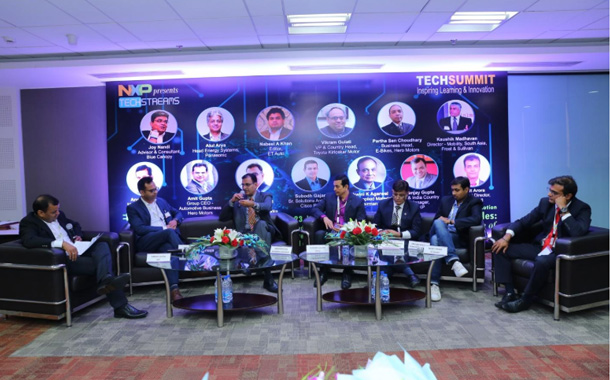Eminent industry leaders join the panel and opine the future of Electric Vehicles in India
NXP India organized the TechStreams TechSummit, a panel discussion on Electric Vehicles- The Game Changer of Future Automobiles. The summit saw participation from eminent automobile industry leaders. NXP’s TechStreams is a knowledge sharing platform that includes events, such as the TechTalk, TechConference, TechTutorial, and Tech Summit to promote the spirit of innovation. In essence, TechStreams is a fusion of four technological streams – Security, New Semiconductor Process Technologies, Emerging Domains and High-Performance Analog Signals and RF Designs.
The Panel discussion was a part of the Emerging Domains stream and focused on ‘Electric Vehicles: The game changer of future automobiles’. Some of India’s most valued dignitaries attended the discussion that aimed at debating the role and the future of electric vehicles and their disruptive potential for the automobile industry. The day-long event was divided into two panels that witnessed participation from industry experts, such as Sirish Batchu, Head – Advanced Technology, Mahindra Electric Mobility, Subodh Gajare, Senior Solutions Architect, Cisco, Amit Gupta, Group CEO-Automotive Business, Hero Motors, Vikram Gulati, Country Head & Vice President, Toyota Kirloskar Motors, Arun Malhotra, former MD, Nissan, Mohit Arora, Associate Director, Supplier Solutions – India, IHS Markit – Automotive, Atul Arya, Head Energy Systems, Panasonic, Kaushik Madhavan, Director, Automotive & Transportation, Frost & Sullivan and Peeyush Asati, Founder & Managing Director, Vecmocon.
Speaking on the EVs space, Sanjay Gupta, Vice President & India Country Manager, NXP India said, ‘Globally, the EV segment is growing at a double digit every year. It is important to equip the EVs of future with the right technology and infrastructure to fill up the potential that it brings along for nations in general and auto makers specifically. The growth of the EV market presents a massive innovation opportunity around battery, charging and connectivity technologies that will drive newer business models. This process has also been driven in India with an attempt to gradually control pollution, cut oil imports and compete for a slice of the expanding global EV market.’’
The discussions revolved around the global success stories to drive India as a big market for EVs during the current times and the coming decade followed by the innovations in EVs to ride the future. It was also debated that the India still faces some challenges to EVs while there is immense potential and opportunities to grow the industry from internal combustion engine vehicles to zero emission vehicles. The major hurdle in the way of successful implementation of EV is the charging infrastructure and government’s ambitious plans for a mass scale shift to electric vehicles (EVs) will bring electric vehicles on Indian roads in the coming future.
Here is a glimpse of what the leaders had to say during the summit today –
Amit Gupta, President & CEO – Group Automotive Business, Hero Motors said, ‘’It’s no rocket science that electric vehicles are the future. Modern advances in electric technology are making electric powered vehicles closer to mainstream reality than they ever were. If the progress continues at the current pace, the conventional internal combustion engine powered vehicles may soon go extinct. In terms of the Indian society, a push for the adoption of electric vehicles is the need of the hour. We, at hero are completely prepared for the future and our working along with our partner Hewland, UK on e-transmission from design to cost for OEMs in EU.’’
Arun Malhotra, Former MD, Nissan India, said, ‘’EV technology in India is at the inflection point. The Indian Government has to play the role of a catalyst in terms of a clear roadmap, investment in EV infrastructure and subsidy to the final users to kick start it.’’
When asked about EV policy for India and what we can take/learn from other countries, Mohit Arora, Associate Director, Supplier Solutions – India, IHS Markit – Automotive responded, “When we look at EV penetration strategies globally it boils down to ‘every nation to its own’ thereby implying that there is no set formula on policy that India can pick or borrow. Every nation has to adopt policies according to one’s own strengths and weaknesses in line with the entire EV ecosystem. For India, at the moment, our government is in the drafting phase seeking inputs from different nodal agencies and other stake holders.”
Subodh Gajare, Senior Solutions Architect, CISCO, said, “There will be a few disruptive trends for the future of urban mobility with AI and autonomous cars shaping new business models. Electrification of vehicles will demand innovation in battery and storage technologies for mass adoption.”




